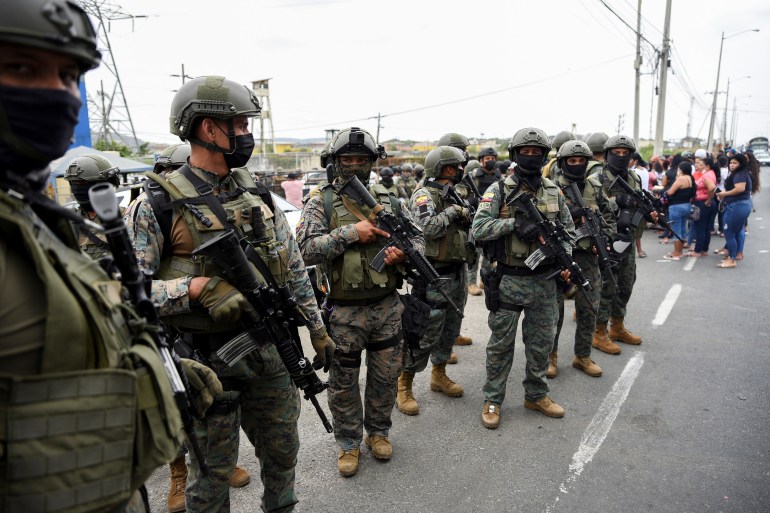Month: April 2022
GAS! An affordable option for Gas Masks – Parcil Safety
Ecuador declares emergency in three provinces over drug violence

Ecuadoran President Guillermo Lasso has imposed a state of emergency in three provinces blaming drug-related violence.
“I have declared a state of exception in the [coastal] provinces of Guayas, Manabi and Esmeraldas, effective from midnight tonight,” he said in a speech broadcast by state media on Friday.
It is the second time Lasso has used emergency powers to counter violence that has surged since late last year. His government blames drug trafficking gangs who use the country as a transit point for exporting narcotics to the United States and Europe for the violence.
Some 9,000 police and soldiers will be deployed to patrol the three provinces during the two-month state of emergency, and a curfew enforced between 11pm and 5am local time (04:00-10:00 GMT) for certain areas, including the town of Duran, located near the port of Guayaquil.
Drug trafficking in Ecuador has led to a surge in crime, with 1,255 people killed since the start of the year, according to official figures.
It has also created a battleground inside Ecuador’s prisons between thousands of inmates with ties to powerful Mexican drug cartels. Some 350 people have been killed in jail massacres since February 2021.
Lasso previously declared a state of emergency in October last year, but the move faced criticism from the Constitutional Court, which halved the emergency period to 30 days and said the military should only support police operations.
SOURCE: NEWS AGENCIES
ALJAZEERA.COM
ISIS targets thermal camera in Diyala, Iraqi Army thwarts the attack

Shafaq News/ On Thursday, the Iraqi army foiled an attack targeting a security point on the outskirts of Muqdadiya district, northeast of Diyala.
ISIS snipers attacked a security point belonging to the Iraqi army in Arab Fares village, north of Muqdadiya district, 45 km northeast of Baqubah.
He added that the army forces thwarted the attack and prevented the terrorists from destroying a thermal camera.
According to the source, this is the 14th attack on thermal cameras in less than a month.
It is worth noting that many villages north of Muqdadiya are considered hotbeds of ISIS militants who hide in dense orchards, despite the presence of security forces and Popular Mobilization Forces.
In 2017, Iraq declared final victory over ISIS after Iraqi forces drove its last remnants from the country; the militant group captured about a third of Iraq’s territory.
The war has had a devastating impact on the areas previously controlled by the militants. About 3.2 million people remain displaced.
Yet, ISIS still has sleeper cells in several Iraqi Governorates.
shafaq.com
What Are the International Military Options for the Sahel?
By Nina Wilén, Paul D. Williams
For the last decade, a unique ecosystem of external forces has deployed over 21,000 uniformed personnel across the Sahel to help address multiple and intersecting political, economic, security, humanitarian, and environmental crises. The United Nations (UN) has deployed a stabilization mission in Mali (MINUSMA); France has led a regional counterterrorism force, Operation Barkhane, and since early 2020, a European Task Force Takuba deployed under French command; the European Union (EU) runs one military training mission in Mali, and two civilian missions in Mali and Niger, all focused on security force and rule of law assistance; and the United States and various other Western countries provide bilateral forms of security force assistance to the region’s states. In addition, since 2017, the G5 Sahel states (Burkina Faso, Chad, Mali, Mauritania, and Niger) have deployed a roughly 5,200-strong counterterrorism Joint Force which operates along the region’s porous borders; since 2020, the African Union (AU) has indicated its desire to establish a 3,000-strong force, but so far no troops have deployed; and in March 2022, Niger called for Nigeria to help establish yet another military force to combat militants across the region. (Niger and Nigeria are already part of the Multinational Joint Task Force (MNJTF), together with Chad and Cameroon, to fight jihadists—primarily Boko Haram—in the Lake Chad basin.)
To read the full article, please visit the IPI Global Observatory website.
(Photo credit: Nina Wilén)
egmontinstitute.be
